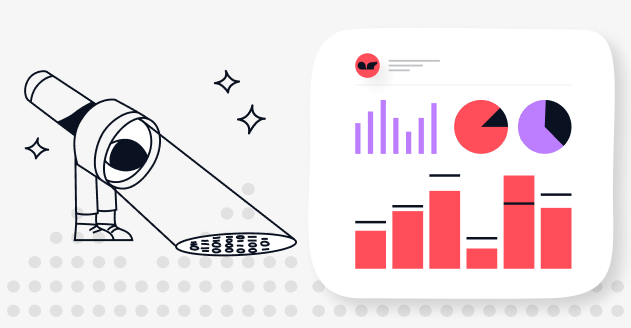Predicting the Future of Data Catalogs: Trends and Forecasts
What does the future hold for data catalogs? We take a closer look at the various emerging trends and forecasts.

Nowadays, the sun never sets on the data kingdom. Day in and day out, data streams from countless sources: IoT devices, social media, transaction logs, and more. Businesses are knee-deep in data, a vast digital ocean with valuable insights hidden below its surface.
However, these insights can only be found with the right tool, and that's where data catalogs come into the picture.
As technology continues to evolve, particularly with the rise of AI, it's natural to wonder what the future holds for data catalogs. So let's dive in and explore the emerging trends and forecasts that are shaping this critical tool.
[Insert image of the data catalog landscape by generations of catalogs]
Data Cataloging: The Emerging Trends
The sphere of cataloging isn't static, It is continuously evolving, with several emerging trends redefining the landscape. Let's understand each one of them.
Embracing AI and ML
When your business is flooded with data, manually cataloging it is just as impractical as trying to count every grain of sand on a beach. Recognizing this, organizations are increasingly integrating Artificial Intelligence (AI) and Machine Learning (ML) into their cataloging processes.
Take, for instance, a global retail company with millions of transactions occurring daily. This data could include customer purchasing behavior, preferences, and more. AI and ML could help automate the cataloging process. This will make it possible to quickly identify trends and patterns that would be impossible to see otherwise.
By automating the process, companies not only improve their efficiency but also their data quality. AI and ML can identify inconsistencies and redundancies, a task that would be time-consuming for human analysts. As we move forward, the integration of AI and ML into data catalogs is set to increase.
The Rise of Cloud-based Data Catalogs
The cloud isn't just an ethereal phenomenon anymore, it's transforming businesses across the globe, including the world of data cataloging. Many organizations are adopting cloud-based data catalogs, drawn by the various benefits they offer.
For instance, imagine a rapidly-growing startup. Initially, their data requirements might be small, but as they expand, so too does their inventory of data assets. A cloud-based catalog offers scalability – they can adjust their data storage needs as required, avoiding unnecessary expenditure on IT infrastructure.
Moreover, cloud-based data catalogs facilitate data accessibility from various data sources. Data consumers can access the data from anywhere, at any time. This enables data collaboration and efficiency within organizations. As we look ahead, cloud-based data catalogs are only going to become more prevalent.
User-Friendly Data Catalogs for All
In the past, only data scientists used data catalogs because only they could understand complex data codes. Today, businesses understand that everyone, not just top-level executives, can benefit from data-driven decisions.
This means that data catalogs are becoming more user-friendly. This is enabling individuals with varying levels of technical skills to explore, understand, and derive insights from data.
Modern catalogs now feature intuitive search interfaces, clear data lineage visuals, and simple, easy-to-understand data descriptions. This trend toward user-friendly data catalogs is set to continue into the future. It's set on making catalogs an invaluable tool for every member of the organization.
The Forecast: What's Ahead?
Data catalogs are gaining more importance. Mordor Intelligence reports show that the data catalog market is expected to grow from $820 million in 2022, to $1,220 million by 2027. This big jump underscores the rising need for data catalog solutions.
To grasp the future of data catalogs, it's crucial to examine the market segments: user type, component, deployment method, and region. Each segment has unique trends that shape the evolution of data catalogs.
By User
Users of data catalogs encompass a diverse group that includes data engineers, data analysts, data scientists, and even business users. The culture of data-driven decision-making is becoming an integral part of organizations worldwide. We're witnessing a rising demand for accessible and user-friendly data catalogs across all user types.
For example, data analysts and data scientists rely heavily on data catalogs. They use it to accelerate the data preparation process, improve data quality, and perform their tasks more efficiently. Meanwhile, business users, often non-technical employees, increasingly utilize data catalogs to gain insights and drive their decision-making processes. This democratisation of data access is influencing the growth of the data catalog market significantly.
By Component
The data catalog market can also be segmented into stand-alone solutions, integrated solutions, and services. Stand-alone solutions currently hold a major share of the market due to their capability to address specific data needs. These solutions are typically designed to perform specialized functions like data discovery, data governance, or data lineage.
On the other hand, integrated solutions and services are gaining traction. Why? Because they offer a comprehensive approach to data cataloging, encompassing various aspects of data management.
Services, in particular, are growing steadily, as businesses often require expert assistance to manage and maintain their complex data landscapes effectively. Expect to see a rise in the demand for integrated solutions and services. As companies look to optimize their data & metadata management strategies holistically.
By Deployment Mode
When it comes to setting up data catalogs, companies do this in a couple of ways. They either keep them on their own systems (on-premise) or use internet-based services (cloud-based solutions). Right now, many companies prefer to keep data catalogs on their own systems. This is especially true for businesses that want full control over their data or have to handle sensitive information.
But, more and more companies are starting to use cloud-based data catalogs. Why? Because cloud services come with several benefits.
For example, they can easily scale up or down based on a company's data storage needs. They're also more cost-effective as businesses don't need to spend a lot on computer systems upfront. Plus, they make it easier for teams to work together from anywhere.
As more businesses continue to go digital, we'll likely see more of them adopting cloud-based data catalogs in the future.
Geography: Where's the Growth?
North America currently dominates the data catalog market, thanks to its advanced tech landscape and many big companies. However, the Asia-Pacific region is quickly catching up, due to increased digital adoption and the growing importance of data management.
Looking at user types, components, deployment modes, and geographical areas helps us better understand and forecast the future of data catalogs. As our reliance on data keeps growing, data catalogs will continue to become more critical across all these sectors.
In Conclusion

Looking toward the future, it's obvious that data catalogs are becoming more and more important for businesses that rely on data. As technology keeps improving and more businesses start to use data catalogs, their future is looking really good. They're in the middle of some exciting trends, like using AI and ML, moving to cloud-based services, and easy access to data for everyone. So, data catalogs aren't just useful right now - they're also a smart choice for the future.
Your future with data catalogs
Are you looking for a data catalog solution? At Castor, we are building a data documentation tool for the Notion, Figma, Slack generation. We designed our catalog software to be easy to use, delightful and friendly. Want to check it out? Try our data catalog tool for free.
You might also like
Get in Touch to Learn More



“[I like] The easy to use interface and the speed of finding the relevant assets that you're looking for in your database. I also really enjoy the score given to each table, [which] lets you prioritize the results of your queries by how often certain data is used.” - Michal P., Head of Data




.png)



